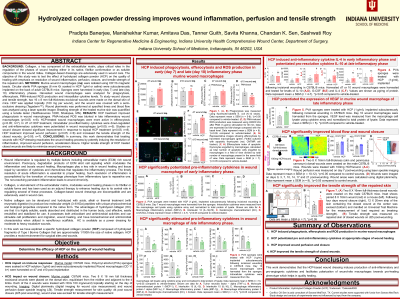Laboratory Research
(LR-042) Hydrolyzed collagen powder dressing improves wound inflammation, perfusion and tensile strength
Friday, April 28, 2023
7:15 PM - 8:30 PM East Coast USA Time

Pradipta Banerjee, PhD; Savita Khanna, PhD; Manishekhar Kumar, PhD; Chandan Sen, PhD – Indiana University
Introduction: Collagen, a key component of the extracellular matrix, plays critical roles in the regulation of the phases of wound healing either in its native, fibrillar conformation or as soluble components in the wound milieu. Collagen-based dressings are extensively used in wound care. The objective of this study was to test the effect of hydrolyzed collagen powder (HCP) on the quality of healing with emphasis on resolution of wound inflammation, perfusion, closure, and tensile strength of the repaired skin.
Methods: Murine wound macrophages were isolated using CD11b magnetic beads. Circular sterile PVA sponges (8 mm Ꝋ; soaked in HCP 1g/ml or saline) were subcutaneously implanted on the back of adult C57BL/6 mice. Sponger were harvested in early (day 7) and late (day 10) inflammatory phases. Harvested wound macrophages were analyzed for phagocytosis, efferocytosis, PMA-induced ROS production and intracellular cytokine levels. To study wound closure and tensile strength, two 16 x 8 mm full-thickness excisional wounds were made on the dorsal skin of mice. HCP was applied topically (100 mg per wound), and the wound was covered with a semi-occlusive dressing (Tegaderm™). Wound planimetry was performed at specified times and blood flow was analyzed using a laser speckle imager. Breaking strength of the healed murine skin was quantified using a tensile tester (TestResources 100R, Shakopee, MN).
Results: HCP treatment improved phagocytosis in wound macrophages. PMA-induced ROS was blunted in late inflammatory wound macrophages (p < 0.05; n=8). HCP-treated wound macrophages were more active in efferocytosis (p < 0.05; n=7). In d7 of HCP treatment, intracellular pro-inflammatory cytokines were downregulated and anti-inflammatory cytokines were potentiated in wound macrophages (p < 0.05; n=5). Studies on wound closure showed significant improvement in response to topical HCP treatment (p < 0.05; n=8). HCP treatment improved wound perfusion (p < 0.05; n=8) and increased the tensile strength of the closed wounds. (p < 0.05; n=7).
Discussion: In summary, this work demonstrates that treating wounds with HCP dressing reactivates the wound healing process by potently inducing the resolution of inflammation, improved wound perfusion, accelerated closure. Higher tensile strength of HCP treated closed wounds are likely to minimize wound recurrence.
Methods: Murine wound macrophages were isolated using CD11b magnetic beads. Circular sterile PVA sponges (8 mm Ꝋ; soaked in HCP 1g/ml or saline) were subcutaneously implanted on the back of adult C57BL/6 mice. Sponger were harvested in early (day 7) and late (day 10) inflammatory phases. Harvested wound macrophages were analyzed for phagocytosis, efferocytosis, PMA-induced ROS production and intracellular cytokine levels. To study wound closure and tensile strength, two 16 x 8 mm full-thickness excisional wounds were made on the dorsal skin of mice. HCP was applied topically (100 mg per wound), and the wound was covered with a semi-occlusive dressing (Tegaderm™). Wound planimetry was performed at specified times and blood flow was analyzed using a laser speckle imager. Breaking strength of the healed murine skin was quantified using a tensile tester (TestResources 100R, Shakopee, MN).
Results: HCP treatment improved phagocytosis in wound macrophages. PMA-induced ROS was blunted in late inflammatory wound macrophages (p < 0.05; n=8). HCP-treated wound macrophages were more active in efferocytosis (p < 0.05; n=7). In d7 of HCP treatment, intracellular pro-inflammatory cytokines were downregulated and anti-inflammatory cytokines were potentiated in wound macrophages (p < 0.05; n=5). Studies on wound closure showed significant improvement in response to topical HCP treatment (p < 0.05; n=8). HCP treatment improved wound perfusion (p < 0.05; n=8) and increased the tensile strength of the closed wounds. (p < 0.05; n=7).
Discussion: In summary, this work demonstrates that treating wounds with HCP dressing reactivates the wound healing process by potently inducing the resolution of inflammation, improved wound perfusion, accelerated closure. Higher tensile strength of HCP treated closed wounds are likely to minimize wound recurrence.

.png)